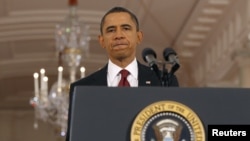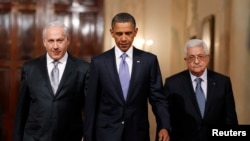As Barack Obama begins his second four-year term as president, there is renewed talk about U.S. policy toward the Middle East, especially about what might be in store for the Israeli-Palestinian peace process.
The talk gained momentum when Senator John Kerry, expected to be confirmed next week as the new U.S. secretary of state, testified on Thursday that reviving Israeli-Palestinian peace talks would be one of his top priorities.
Kerry told the Senate Foreign Relations Committee at his confirmation hearing that he hoped the latest Israeli elections might open a window of opportunity to resume peace talks and that a two-state solution – creating a Palestinian state alongside Israel – was the key to progress on this front.
The possibility of renewed Israeli-Palestinian talks has been a topic discussed by Washington Middle East policy analysts for months now, alongside such issues as how the United States should deal with the civil war in Syria and other political upheavals that have grown out of the now two-year-old “Arab Spring” uprisings.
David Pollock, a senior fellow at the Washington Institute for Near East Policy, says the U.S. could start to move toward renewed talks by clearly stating its continued support for the two-state solution.
“The U.S. should also ask both Israelis and Palestinians to reiterate their public commitment to the principle of a permanent, peaceful two-state solution to their conflict,” Pollock says. He adds, however, that it would be a mistake for Washington to offer its own formula for a permanent solution just yet.
“I don’t think the U.S. should put a package now on the negotiating table because the parties are far apart on substance,” he says. “It would be a mistake to propose something that is probably doomed to fail.”
Other Middle East analysts disagree, urging Obama’s new administration to move quickly. One of them is Marwan Muasher of the Carnegie Endowment for International Peace.
“The choice now for the Obama administration is between the difficulty of achieving peace today and the impossibility of achieving it tomorrow” Muasher says. “The U.S. must commit itself to work through the Quartet [the United Nations, European Union, Russia and the U.S.] to bring about a speedy settlement of the conflict and put a package on the negotiating table before it is too late.”
The Arab Spring
Another challenge facing the new Obama administration is how to deal with the sweeping changes brought onto the Middle East by the Arab Spring.
Muasher says Washington should tailor its diplomacy to each individual Arab Spring nation rather than attempt a one-size-fits-all policy. He also says the U.S. should avoid imposing political conditions on aid and trade because that could provoke strong nationalistic reactions.
David Pollock thinks that would be a mistake. “While we try as hard as we can to maintain our close ties with Egypt, for example, we have to tie our support, whether politically or economically, to certain requests like a continued Egyptian adherence to the peace treaty with Israel.”
Syria
Some experts believe a resolution to the civil war in Syria in intrinsically linked to Iran.
William Quandt is a former member of the National Security Council, influential Middle East analyst and professor at the University of Virginia. Quandt says Washington should quickly turn its attention toward seeking a diplomatic reconciliation with Tehran.
“The new secretary of state should find a reliable channel to Iran’s top leadership and start his own assessment of how to forge a new relationship,” Quandt says. “A deal on nuclear capabilities needs to be a part of a larger package. If we could succeed, the benefits would be seen in places such as Iraq, Syria, Lebanon and the Gulf region.”
Quandt, along with Pollock, expects Syria to be a serious challenge to U.S. policies in the Middle East because the regime of President Bashar al-Assad, by many indications, will not be able to restore its power after almost two years of civil war and the Syrian opposition does not appear to be poised for a clear-cut victory.
Pollock describes the Syrian civil war as a tragic example of the Arab Spring gone terribly wrong. “U.S. policy will continue to be extremely cautious, so my advice to the administration is to realize that the situation in Syria demands a more active U.S. role because the risks are enormous for the region,” Pollock says.
The talk gained momentum when Senator John Kerry, expected to be confirmed next week as the new U.S. secretary of state, testified on Thursday that reviving Israeli-Palestinian peace talks would be one of his top priorities.
Kerry told the Senate Foreign Relations Committee at his confirmation hearing that he hoped the latest Israeli elections might open a window of opportunity to resume peace talks and that a two-state solution – creating a Palestinian state alongside Israel – was the key to progress on this front.
The possibility of renewed Israeli-Palestinian talks has been a topic discussed by Washington Middle East policy analysts for months now, alongside such issues as how the United States should deal with the civil war in Syria and other political upheavals that have grown out of the now two-year-old “Arab Spring” uprisings.
David Pollock, a senior fellow at the Washington Institute for Near East Policy, says the U.S. could start to move toward renewed talks by clearly stating its continued support for the two-state solution.
“The U.S. should also ask both Israelis and Palestinians to reiterate their public commitment to the principle of a permanent, peaceful two-state solution to their conflict,” Pollock says. He adds, however, that it would be a mistake for Washington to offer its own formula for a permanent solution just yet.
“I don’t think the U.S. should put a package now on the negotiating table because the parties are far apart on substance,” he says. “It would be a mistake to propose something that is probably doomed to fail.”
Other Middle East analysts disagree, urging Obama’s new administration to move quickly. One of them is Marwan Muasher of the Carnegie Endowment for International Peace.
“The choice now for the Obama administration is between the difficulty of achieving peace today and the impossibility of achieving it tomorrow” Muasher says. “The U.S. must commit itself to work through the Quartet [the United Nations, European Union, Russia and the U.S.] to bring about a speedy settlement of the conflict and put a package on the negotiating table before it is too late.”
The Arab Spring
Another challenge facing the new Obama administration is how to deal with the sweeping changes brought onto the Middle East by the Arab Spring.
Muasher says Washington should tailor its diplomacy to each individual Arab Spring nation rather than attempt a one-size-fits-all policy. He also says the U.S. should avoid imposing political conditions on aid and trade because that could provoke strong nationalistic reactions.
David Pollock thinks that would be a mistake. “While we try as hard as we can to maintain our close ties with Egypt, for example, we have to tie our support, whether politically or economically, to certain requests like a continued Egyptian adherence to the peace treaty with Israel.”
Syria
Some experts believe a resolution to the civil war in Syria in intrinsically linked to Iran.
William Quandt is a former member of the National Security Council, influential Middle East analyst and professor at the University of Virginia. Quandt says Washington should quickly turn its attention toward seeking a diplomatic reconciliation with Tehran.
“The new secretary of state should find a reliable channel to Iran’s top leadership and start his own assessment of how to forge a new relationship,” Quandt says. “A deal on nuclear capabilities needs to be a part of a larger package. If we could succeed, the benefits would be seen in places such as Iraq, Syria, Lebanon and the Gulf region.”
Quandt, along with Pollock, expects Syria to be a serious challenge to U.S. policies in the Middle East because the regime of President Bashar al-Assad, by many indications, will not be able to restore its power after almost two years of civil war and the Syrian opposition does not appear to be poised for a clear-cut victory.
Pollock describes the Syrian civil war as a tragic example of the Arab Spring gone terribly wrong. “U.S. policy will continue to be extremely cautious, so my advice to the administration is to realize that the situation in Syria demands a more active U.S. role because the risks are enormous for the region,” Pollock says.






